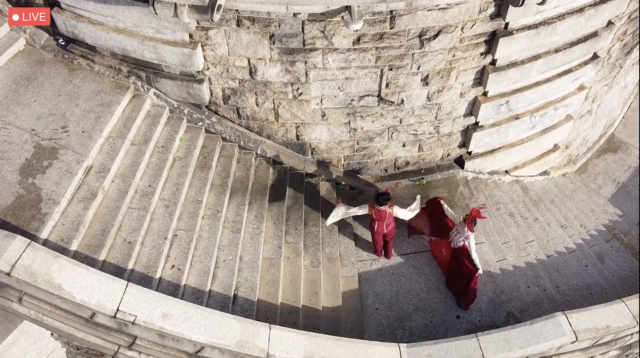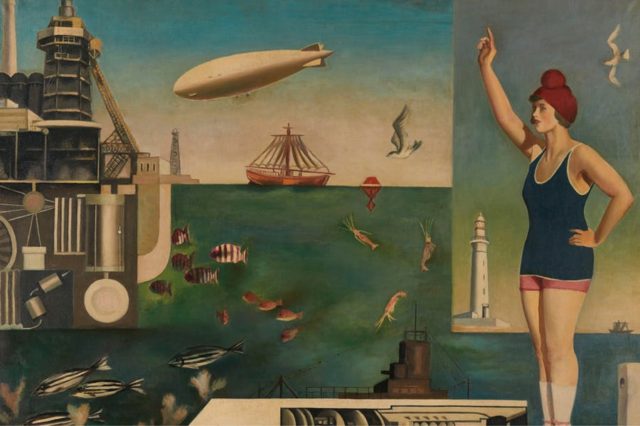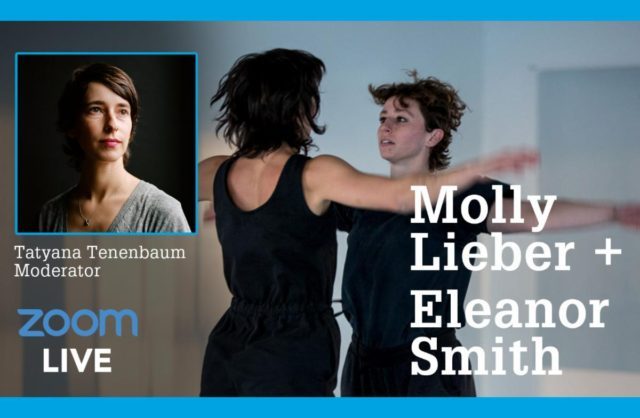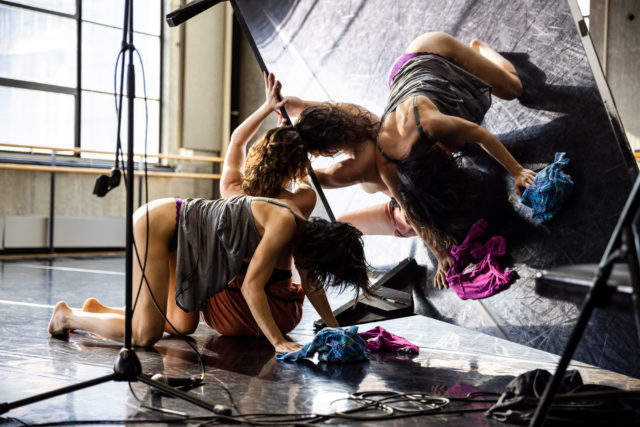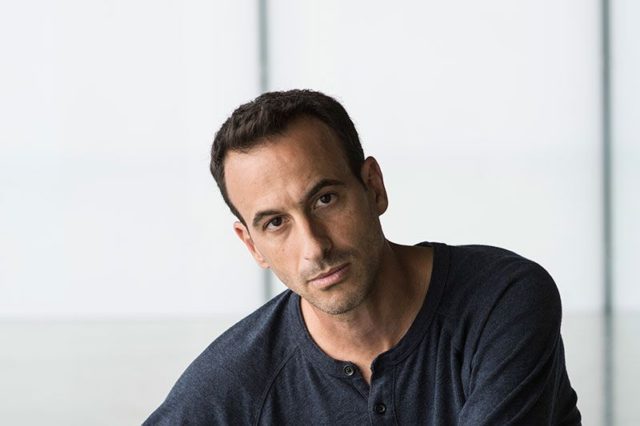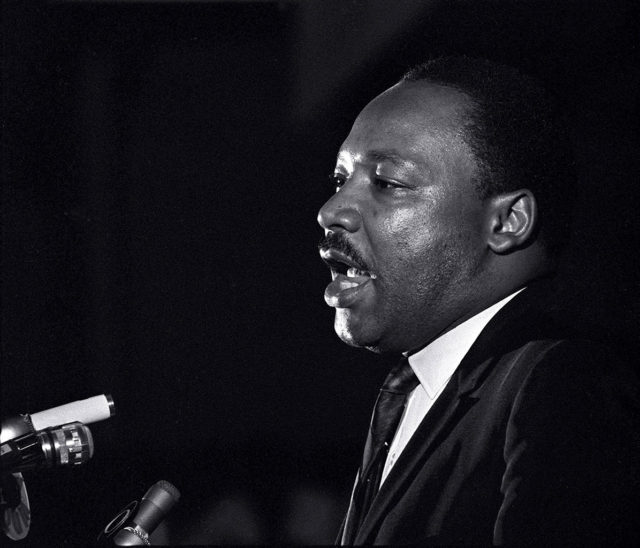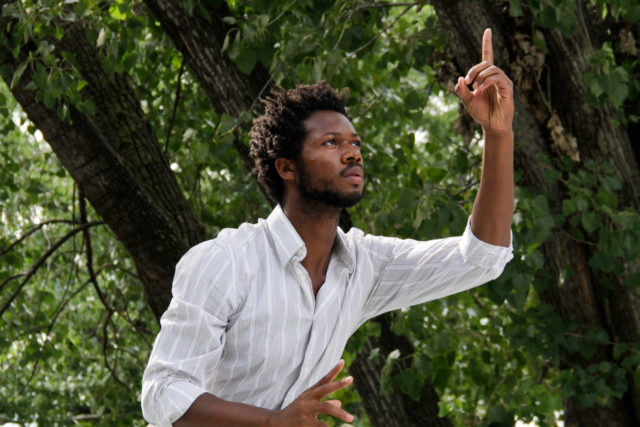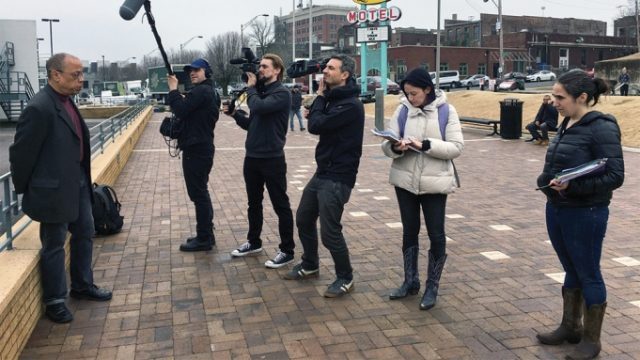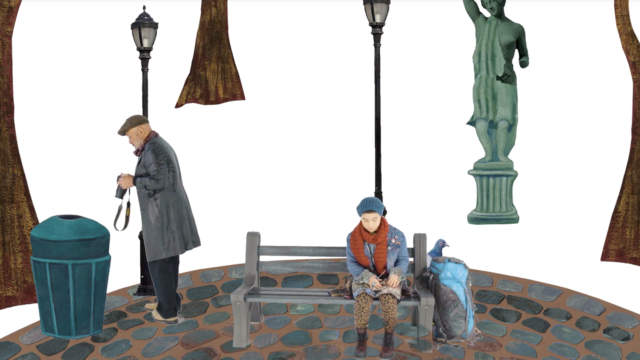
Addressless presents complicated choices for three homeless New Yorkers over three winter months
ADDRESSLESS
Rattlestick Playwrights Theater online
Thursday – Tuesday through February 13, $1 – $30
www.rattlestick.org
Rattlestick’s virtual, participatory Addressless is an involving piece of activist theater that could only happen online, away from its home on Waverly Pl. The interactive show shines a light on housing insecurity, an issue that has grown during the coronavirus pandemic as New York City shuttles the homeless between hotels and congregate and noncongregate shelters.
Created and directed by Martin Boross of the Hungarian collective STEREO AKT and written by playwright and social worker Jonathan Payne, Addressless is a choose-your-own-adventure style production in which the audience is assigned to one of three teams, trying to help their designated character find safe haven in a harsh city. Louis (Joey Auzenne) is a thirty-three-year-old army vet who is having a difficult time getting a job and a place to sleep. Josie (Bianca Norwood) is a teenage runaway from Buffalo escaping from a drug-addicted mother and an alcoholic father. And Wallace (Shams DaBaron, aka “Da Homeless Hero”) is a fifty-two-year-old single father who’s been homeless on and off since he was ten. The show is hosted by real-life social worker Hope Beaver, who is originally from Texas and now works at a family shelter at Henry Street Settlement, caring for single mothers and their children eight and under.
Addressless is set up as a game, and team members vote on what their character should do over the course of three winter months. Each choice affects how much money the individual has and the state of their health as they attempt to accumulate $1500 to qualify for a housing lottery to live rent free for a year in a new development on the Lower East Side. They choose between sleeping on the streets, which requires the least amount of cash but has the most severe impact on their health, going to a shelter (a kind of middle road), or couch surfing (best for health but most expensive).

A social worker offers choices to military vet Louis (Joey Auzenne) in interactive virtual show from Rattlestick
The teams meet privately in breakout rooms to discuss the options, then vote on the final decision. It is suggested you keep your camera on, and you are encouraged to participate but don’t have to. Being able to see where everyone is zooming in from emphasizes the audience’s privilege: having somewhere to live, owning a computer, laptop, or handheld device, and being able to afford a ticket to the show. (General admission is $30, but there are pay-what-you-can nights beginning at $1.)
Although you’re supposed to comment and vote only on your specific team’s character, the night I went a few people spoke far too often about and voted for all three, which got a little annoying, so hopefully the rules have been clarified since then. I was on Team Wallace, and I found it invigorating to help him make his choices each month. The discussions are about where they will sleep as well as deciding, for example, whether to pose for a photographer for twenty bucks, go to an acquaintance’s work party or attend an AA meeting, or accept a shelter transfer from Manhattan to the Bronx. Depending on what the team decides, the vote is followed by a prerecorded scene depicting the results of the choice. Spoiler alert: There are not a whole lotta good outcomes.
The supporting cast in the prerecorded vignettes includes Faith Catlin as an AA facilitator, Alok Tewari as an ER doctor, Paten Hughes as a high school classmate of Josie’s, Keith Randolph Smith as the photographer, and Michael Laurence as a sales manager, in addition to Chima Chikazunga, Mahira Kakkar, Tara Khozein, Olivia Oguma, and Lisa Ramirez. The production design is by Johnny Moreno, with sets and props by Patricia Marjorie, costumes by Olivera Gajic, music by Tara Khozein, sound by Julian Evans, graphics and animation by Maiko Kikuchi, video editing by Matthew Russell, and integration design by Victoria A. Gelling. It’s not the flashiest online production, instead more DIY that fits in with the overall theme.
It might be a game — Payne (The Revolving Cycles Truly and Steadily Roll’d, The Briar Patch) is a self-proclaimed Dungeons & Dragons geek, so he knows about character and narrative — but it’s built to make you care deeply about the three homeless people, humanizing them, the way you probably wouldn’t if you simply passed them on the street; when I served as Wallace’s banker for December and raised him the smallest amount of money of the three of them, I was truly disappointed in myself, and that failure has stayed with me. Wallace was still upbeat, as that is first-time actor DaBaron’s general nature; during the pandemic, DaBaron, who is also a writer, filmmaker, and hip-hop artist, advocated for the homeless all around the city and particularly the men who were moved to the Lucerne Hotel on the Upper West Side. Auzenne (Wu Tang: An American Saga, Our Lady of 121st Street) plays it much harder as Louis, while Norwood (Plano) gives Josie a distrustful edge.
Based on actual experiences and presented in partnership with Urban Pathways and Community Access, Addressless deals with unfairness and injustice in a way that will make you feel both helpless and furious. At the beginning of the presentation, Beaver says, “I am not an actor. Wish me luck; I’m gonna need it.” She avails herself well as our host, sharing important statistics about homelessness that are likely to surprise you. But like DaBaron, she believes changes can and will be made. As Wallace points out in one vignette, sometimes he just wants to feel “a part of the world again. Like I was fittin’ right in.” But all choices have consequences when you’re without an address.
[To find out more, you can join a virtual community conversation, “Addressing the Addressless,” on February 8 at 5:00; admission is free with advance RSVP.]
